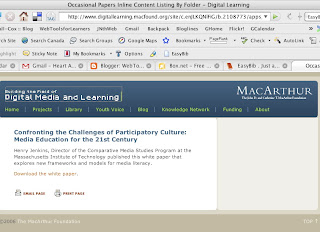Henry Jenkins, Director of the Comparative Media Studies Program at the Massachusetts Institute of Technology has published this white paper, Confronting the Challenges of Participatory Culture: Media Education for the 21st Century that explores new frameworks and models for media literacy.
A central goal of this report is to shift the focus of the conversation about the digital divide from questions of technological access to those of opportunities to participate and to develop the cultural competencies and social skills needed for full involvement. Schools as institutions have been slow to react to the emergence of this new participatory culture; the greatest opportunity for change is currently found in afterschool programs and informal learning communities. Schools and afterschool programs must devote more attention to fostering what we call the new media literacies: a set of cultural competencies and social skills that young people need in the new media landscape. Participatory culture shifts the focus of literacy from one of individual expression to community involvement.The new literacies almost all involve social skills developed through collaboration and networking.These skills build on the foundation of traditional literacy, research skills, technical skills, and critical analysis skills taught in the classroom. (Bolding added)
The whole paper can be downloaded from - http://tinyurl.com/yyrdpl
Even reading just the two page Executive Summary will give you lots to think about. And the concluding statement shows the dangers of ignoring the new participatory culture Jenkins is writing about:The Challenge Ahead: Ensuring that All Benefit from the Expanding Media Landscape
Writing in the Chronicle of Higher Education (May 19, 2006), Bill Ivey, the former chairman of the National Endowment for the Arts, and Steven J.Tepper, a professor of Sociology at Vanderbilt University, described what they see as the long term consequences of this participation gap:
Increasingly, those who have the education, skills, financial resources, and time required to navigate the sea of cultural choice will gain access to new cultural opportunities....They will be the pro-ams who network with other serious amateurs and find audiences for their work.They will discover new forms of cultural expression that engage their passions and help them forge their own identities, and will be the curators of their own expressive lives and the mavens who enrich the lives of others....At the same time, those citizens who have fewer resources—less time, less money, and less knowledge about how to navigate the cultural system—will increasingly rely on the cultural fare offered to them by consolidated media and entertainment conglomerates... Finding it increasingly difficult to take advantage of the pro-am revolution, such citizens will be trapped on the wrong side of the cultural divide. So technology and economic change are conspiring to create a new cultural elite—and a new cultural underclass. It is not yet clear what such a cultural divide portends: what its consequences will be for democracy, civility, community, and quality of life. But the emerging picture is deeply troubling. Can America prosper if its citizens experience such different and unequal cultural lives?
Ivey and Tepper bring us back to the core concerns that have framed this essay: how can we “ensure that all students benefit from learning in ways that allow them to participate fully in public, community, [Creative] and economic life?” How do we guarantee that the rich opportunities afforded by the expanding media landscape are available to all? What can we do through schools, afterschool programs, and the home to give our youngest children a head start and allow our more mature youth the chance to develop and grow as effective participants and ethical communicators? This is the challenge that faces education at all levels at the dawn of a new era of participatory culture.
This is a rich and inspiring read for all who are involved in education.
Jenkins, Henry. "Confronting the Challenges of Participatory Culture: Media Education for the 21st Century." Digital Media and Learning (2006). 27 Apr. 2007


No comments:
Post a Comment